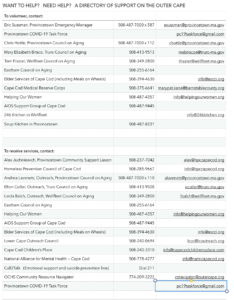PROVINCETOWN — Both the lives and finances of many on the Outer Cape have been rapidly undone by the coronavirus. With movement restricted and the economy at a halt, new and unpredicted stresses arise each day.
A network of social service agencies can offer help. There is help with groceries, bills, rides to appointments, counselors to talk to, even specialists who help people navigate all that help.
The Homeless Prevention Council of Cape Cod is set up to help people keep their housing — by getting assistance before things fall apart.
“There are so many people that are just one paycheck away, or one terrible situation away, from disaster,” said Hadley Luddy, the council’s executive director. “We assess someone’s entire situation — not just housing — and help match people to different kinds of support.”
“People are calling a bunch of different places, trying to survive and feel secure,” said Maggi Flanagan, a case manager at H.P.C. “The thing to do is be connected with a particular agency — maybe it’s the council on aging, maybe a veterans’ group — whichever would be the appropriate lead in hooking up with services, so you’re not making 500 calls and getting discouraged.”
Every town’s council on aging has a mandate to help people over 60 navigate the web of services. “Seniors can call us for anything,” said Chris Hottle, director of the Provincetown Council on Aging. “We know who can provide things. It’s much easier than trying to get out there into the system yourself.”
Helping Our Women and the AIDS Support Group of Cape Cod also help clients across the Cape access a range of resources. Provincetown also has a community support liaison, Alex Juchniewich, whom anyone in the town may call.
There’s a wide range of help available. Food aid comes from the Lower Cape Outreach Council, various food pantries, meal providers such as the Soup Kitchen in Provincetown and Meals on Wheels, food stamps, and more. There can be cash assistance for rent, utilities, home heating, or medical expenses. Many programs help with transportation, by offering rides with volunteers or taxis. There is also counseling and support on every subject from raising young children to arranging end-of-life affairs.

A significant gap has recently opened up in the area of child care. A week after the state closed schools, Gov. Charlie Baker gave the order to close all licensed child care facilities as well. The state is working out an exception for the children of health care workers, but for most people, licensed, professional child care is temporarily not an option.
“What’s probably happening now is a lot of informal care networks, neighbors helping neighbors — and that’s just a really hard position to be in,” said Cindy Horgan, executive director of the nonprofit Cape Cod Children’s Place. “Right now, we are still here answering calls, if someone needs diapers, food, or emotional support. Working from home with your young children can feel very overwhelming.”
Many of these organizations also host recovery groups, most of which are now moving online. All of them serve clients regardless of their citizenship or immigration status, according to Morgan Clark, Provincetown’s health director.
Some new networks are also forming to address the specific burdens of this contagion. A quarantined person, or a vulnerable person who is minimizing exposure, could have money for groceries but no way to get them. A trip to the post office or the laundromat, even walking the dog, becomes a challenge.
The Provincetown COVID-19 Task Force organized itself only a week ago to help with these issues, and it quickly established a working relationship with the Cape Cod Medical Reserve Corps. Both will help retired medical professionals volunteer their expertise.
Don’t wait until an emergency occurs. Now is the time to reach out — to receive help, to offer help, or both.



